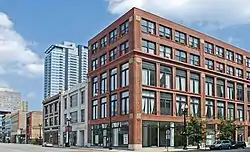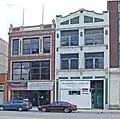Motor Row District
The Motor Row District is a historic district in Chicago's Near South Side community area. Motor Row includes buildings on Michigan Avenue between 2200 and 2500 south, directly west of McCormick Place convention center, and 1444, 1454, 1737, 1925, 2000 S. Michigan Ave., as well as 2246-3453 S. Indiana Ave., and 2211-47 S. Wabash Ave.[2] The district was built between 1905 and 1936 by a number of notable architects.
Motor Row Historic District | |
 | |
| Location | Chicago, Illinois |
|---|---|
| Coordinates | 41°51′10″N 87°37′26″W |
| Area | 28 acres (11 ha) |
| Built | 1905-1936 |
| Architectural style | Early Commercial, Mission/Spanish Revival |
| MPS | Motor Row, Chicago, Illinois MPS |
| NRHP reference No. | 02001387[1] |
| Significant dates | |
| Added to NRHP | 2002 |
| Designated CL | December 13, 2000 |
Auto rows developed in numerous US cities shortly after 1900 as car companies sought to create districts where the sale and repair of cars could become an easy urban shopping experience. At its peak, as many as 116 different makes of automobiles were sold and repaired on Motor Row. Current-day marques that formerly had showrooms on Motor Row included Ford, Buick, Fiat, and Cadillac. Other marques with showrooms there that have since dissolved include Hudson, Locomobile, Marmon, and Pierce-Arrow. Currently, only one car dealer (Fiat/Alfa Romeo) still stands in Motor Row while the remaining buildings have been or are being redeveloped into condominiums, nightclubs, and retail storefronts.
Architecture
The range of buildings in Motor Row illustrates the evolution of the automobile showroom and related product and service buildings, from simple two-story structures used for display and offices to multi-story buildings housing a variety of departments for the repair, storage, painting, and finishing of automobiles. Many of the buildings were designed by significant architects, including Holabird & Roche, Alfred Alschuler, Philip Maher, Albert Kahn, and Christian Eckstorm. The overall design highlights elaborately carved stone work, ornate facades and intricately scrolled ironwork that decorates recessed automotive doorways.
Though characterized by its auto showrooms, Motor Row was also home to newspaper The Chicago Defender, a newspaper voice for Chicago's large African American community. Chess Records was also located in Motor Row and acts such as Muddy Waters, The Rolling Stones, Willie Dixon and many other blues artists recorded there.
Motor Row was designated a Chicago Landmark on December 13, 2000.[2] It was added to the National Register of Historic Places on November 18, 2002.[1]
Redevelopment
In recent years, Motor Row has been undergoing a transformation into a music and entertainment district.[3] Motor Row Brewing [4](formerly known as Broad Shoulders Brewery) opened in the district in January 2015.[5][6] Riff Music Lounge opened in the district in 2013.[7] Motor Row Brewing closed in 2021 as a result of the COVID-19 pandemic, and shortly thereafter a new brewing company, Duneyrr, was started in the same space by two former Lagunitas employees.[8]
In 2011–2012, local officials attempted to lure a Cheap Trick-themed restaurant, music venue and museum to the district; however, this deal fell through in 2013.[9][10][11][12]
Gallery
 2210 S. Michigan
2210 S. Michigan 2222 S. Michigan
2222 S. Michigan 2200 block S. Michigan
2200 block S. Michigan 2400 block S. Michigan
2400 block S. Michigan Former Joyce Ford (now New City Fiat), 2401 S. Michigan
Former Joyce Ford (now New City Fiat), 2401 S. Michigan 2300 block S. Michigan
2300 block S. Michigan 2337 S. Michigan
2337 S. Michigan 2327-2329 S. Michigan
2327-2329 S. Michigan 2315 S. Michigan
2315 S. Michigan 2200 block S. Michigan
2200 block S. Michigan 2245-2251 S. Michigan
2245-2251 S. Michigan 2239 S. Michigan
2239 S. Michigan
References
- "National Register Information System". National Register of Historic Places. National Park Service. July 9, 2010.
- "Motor Row District". City of Chicago Department of Planning and Development, Landmarks Division. 2003. Retrieved November 15, 2010.
- Motor Row revival plans shift into gear - Chicago Tribune - September 30, 2012.
- "More South Loop Suds: Motor Row Brewing Opening in mid-January". December 22, 2014.
- Brewery headed for Motor Row - Chicago Sun-Times - June 22, 2011.
- Broad Shoulders Brewery Coming to Motor Row; Plans for Summer Opening - Sloopin - December 29, 2011.
- Riff Music Lounge Looks To Fulfill Your Dancing Desires - Sloopin - November 18, 2013.
- Noel, Josh (March 4, 2021). "Motor Row Brewing didn't survive the pandemic, but 2 Lagunitas alums hope their wine-beer hybrids will flourish in its place". Chicago Tribune. Retrieved August 20, 2022.
- Cheap Trick Eyes Record Row for museum, concert venue - Chicago Sun-Times - October 4, 2011.
- City Council moves to transform 'Motor Row' into 'Music Row' - Chicago Sun-Times - September 1, 2011.
- Cheap Trick team reveals big plans for Motor Row - Chicago Sun-Times - July 6, 2012.
- Motor Row developer loses Cheap Trick club, dinner theater - Alison Burdo, Chicago Real Estate Daily - March 13, 2013.
Further reading
- Motor Row Memories Jerome M. O'Connor, Chicago Tribune, October 21, 2012.